TH40063E - Analyzing Mass Tourism's Impact on British Society
VerifiedAdded on 2023/04/05
|8
|1853
|450
Essay
AI Summary
This essay critically examines the argument that mass tourism is increasingly unpopular with certain social groups in British society, particularly those focused on sustainability. It discusses how mass tourism commodifies unique places, benefits self-interested developers, and leads to increased costs for local residents. The essay also explores the role of culture in managing tourism destinations, highlighting how cultural factors drive destination attractiveness and contribute to economic prosperity. Furthermore, it identifies both the positive and negative impacts of cultural forms of tourism on host populations in less developed parts of the world, including infrastructure improvements, cultural exchange, and economic opportunities, as well as potential negative effects on sanitation, local culture, and social harmony. Desklib provides access to past papers and solved assignments for students seeking further assistance.
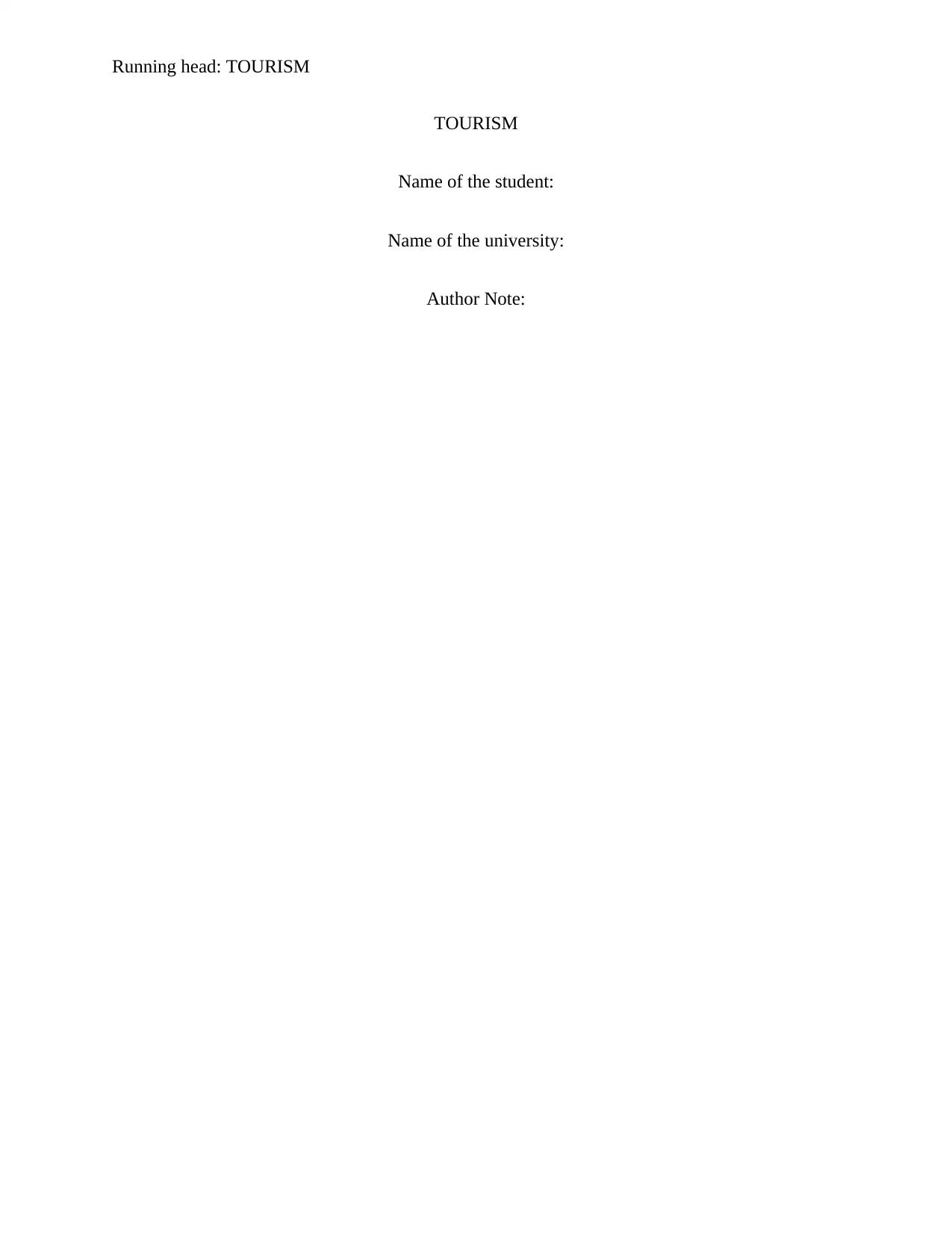
Running head: TOURISM
TOURISM
Name of the student:
Name of the university:
Author Note:
TOURISM
Name of the student:
Name of the university:
Author Note:
Paraphrase This Document
Need a fresh take? Get an instant paraphrase of this document with our AI Paraphraser
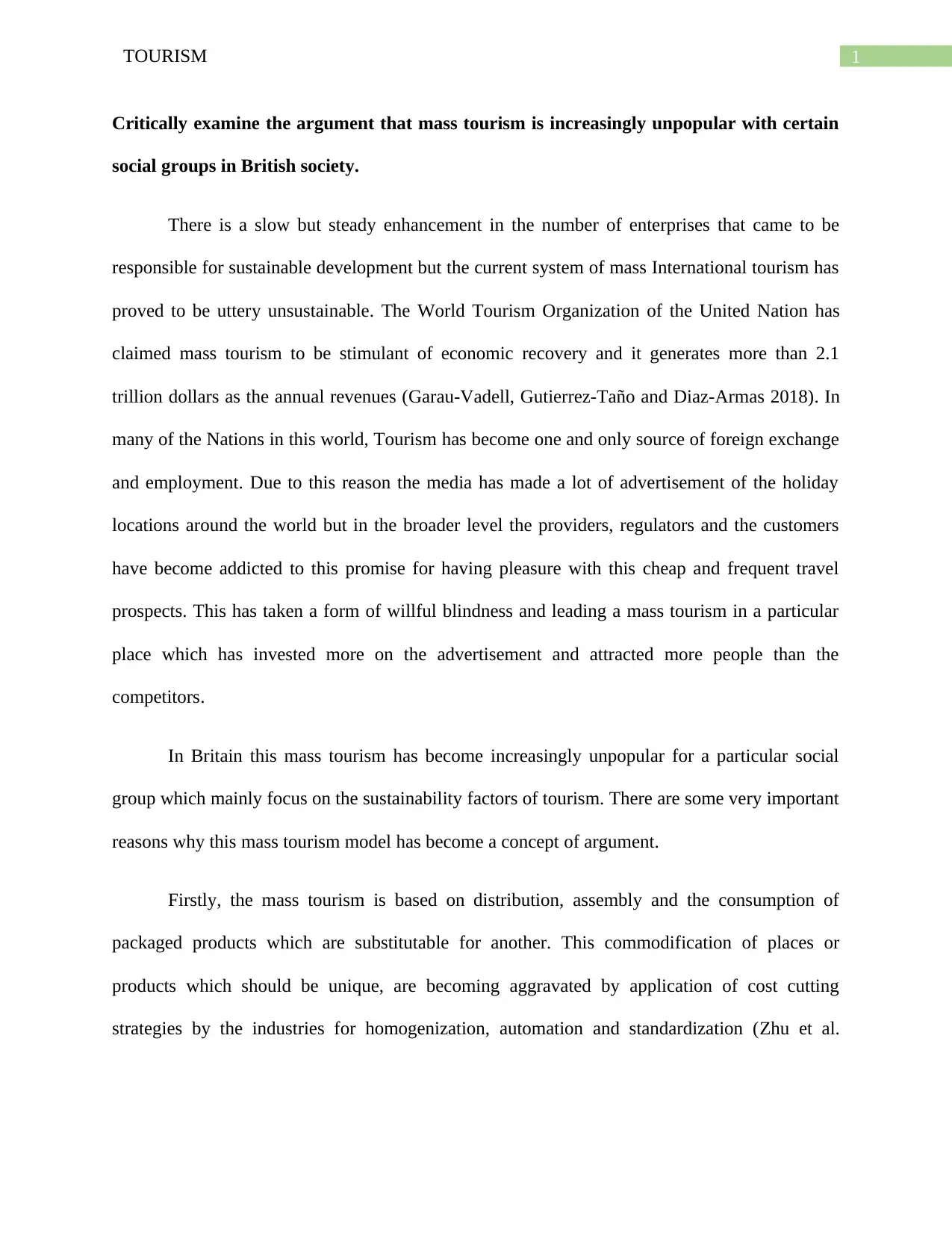
1TOURISM
Critically examine the argument that mass tourism is increasingly unpopular with certain
social groups in British society.
There is a slow but steady enhancement in the number of enterprises that came to be
responsible for sustainable development but the current system of mass International tourism has
proved to be uttery unsustainable. The World Tourism Organization of the United Nation has
claimed mass tourism to be stimulant of economic recovery and it generates more than 2.1
trillion dollars as the annual revenues (Garau-Vadell, Gutierrez-Taño and Diaz-Armas 2018). In
many of the Nations in this world, Tourism has become one and only source of foreign exchange
and employment. Due to this reason the media has made a lot of advertisement of the holiday
locations around the world but in the broader level the providers, regulators and the customers
have become addicted to this promise for having pleasure with this cheap and frequent travel
prospects. This has taken a form of willful blindness and leading a mass tourism in a particular
place which has invested more on the advertisement and attracted more people than the
competitors.
In Britain this mass tourism has become increasingly unpopular for a particular social
group which mainly focus on the sustainability factors of tourism. There are some very important
reasons why this mass tourism model has become a concept of argument.
Firstly, the mass tourism is based on distribution, assembly and the consumption of
packaged products which are substitutable for another. This commodification of places or
products which should be unique, are becoming aggravated by application of cost cutting
strategies by the industries for homogenization, automation and standardization (Zhu et al.
Critically examine the argument that mass tourism is increasingly unpopular with certain
social groups in British society.
There is a slow but steady enhancement in the number of enterprises that came to be
responsible for sustainable development but the current system of mass International tourism has
proved to be uttery unsustainable. The World Tourism Organization of the United Nation has
claimed mass tourism to be stimulant of economic recovery and it generates more than 2.1
trillion dollars as the annual revenues (Garau-Vadell, Gutierrez-Taño and Diaz-Armas 2018). In
many of the Nations in this world, Tourism has become one and only source of foreign exchange
and employment. Due to this reason the media has made a lot of advertisement of the holiday
locations around the world but in the broader level the providers, regulators and the customers
have become addicted to this promise for having pleasure with this cheap and frequent travel
prospects. This has taken a form of willful blindness and leading a mass tourism in a particular
place which has invested more on the advertisement and attracted more people than the
competitors.
In Britain this mass tourism has become increasingly unpopular for a particular social
group which mainly focus on the sustainability factors of tourism. There are some very important
reasons why this mass tourism model has become a concept of argument.
Firstly, the mass tourism is based on distribution, assembly and the consumption of
packaged products which are substitutable for another. This commodification of places or
products which should be unique, are becoming aggravated by application of cost cutting
strategies by the industries for homogenization, automation and standardization (Zhu et al.
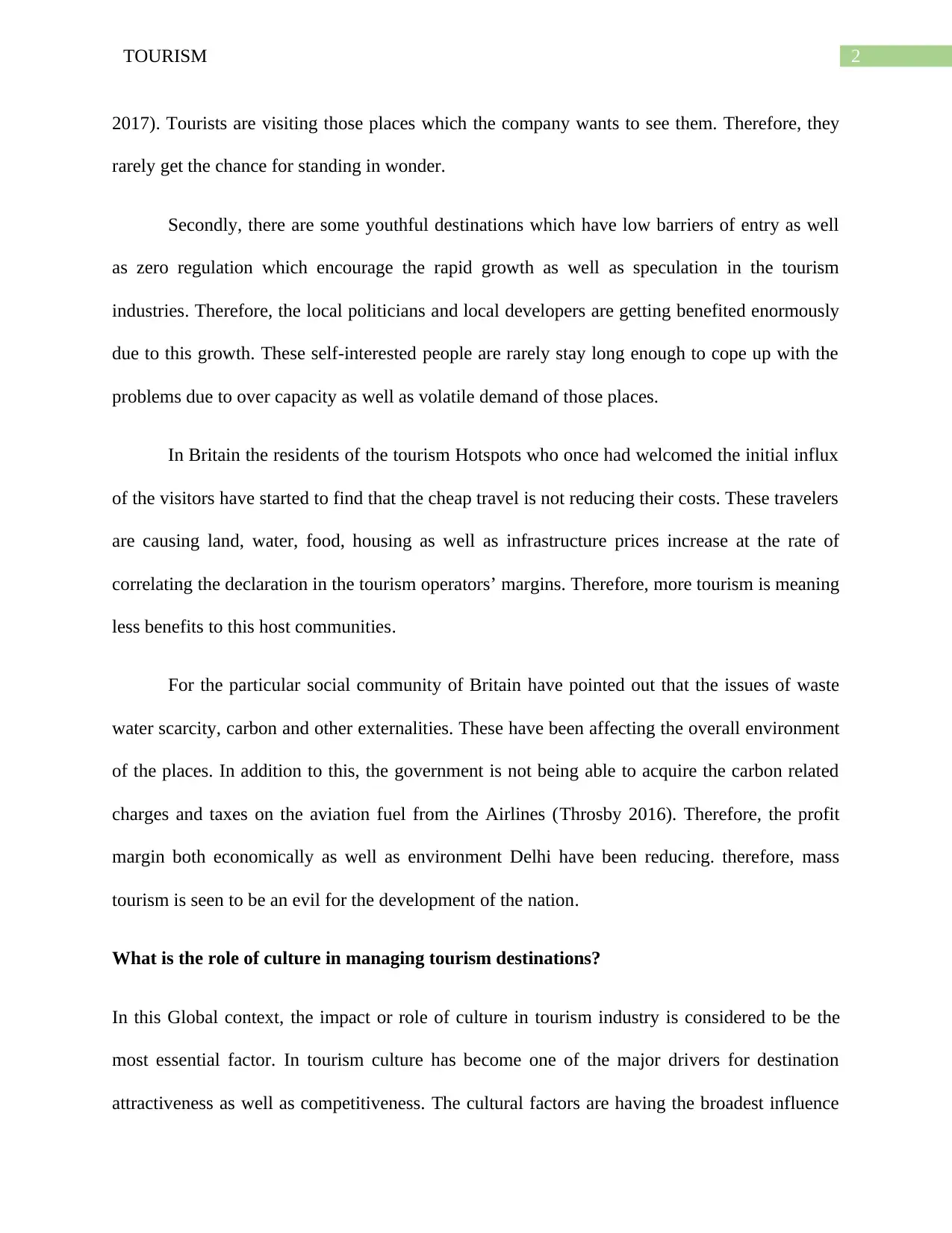
2TOURISM
2017). Tourists are visiting those places which the company wants to see them. Therefore, they
rarely get the chance for standing in wonder.
Secondly, there are some youthful destinations which have low barriers of entry as well
as zero regulation which encourage the rapid growth as well as speculation in the tourism
industries. Therefore, the local politicians and local developers are getting benefited enormously
due to this growth. These self-interested people are rarely stay long enough to cope up with the
problems due to over capacity as well as volatile demand of those places.
In Britain the residents of the tourism Hotspots who once had welcomed the initial influx
of the visitors have started to find that the cheap travel is not reducing their costs. These travelers
are causing land, water, food, housing as well as infrastructure prices increase at the rate of
correlating the declaration in the tourism operators’ margins. Therefore, more tourism is meaning
less benefits to this host communities.
For the particular social community of Britain have pointed out that the issues of waste
water scarcity, carbon and other externalities. These have been affecting the overall environment
of the places. In addition to this, the government is not being able to acquire the carbon related
charges and taxes on the aviation fuel from the Airlines (Throsby 2016). Therefore, the profit
margin both economically as well as environment Delhi have been reducing. therefore, mass
tourism is seen to be an evil for the development of the nation.
What is the role of culture in managing tourism destinations?
In this Global context, the impact or role of culture in tourism industry is considered to be the
most essential factor. In tourism culture has become one of the major drivers for destination
attractiveness as well as competitiveness. The cultural factors are having the broadest influence
2017). Tourists are visiting those places which the company wants to see them. Therefore, they
rarely get the chance for standing in wonder.
Secondly, there are some youthful destinations which have low barriers of entry as well
as zero regulation which encourage the rapid growth as well as speculation in the tourism
industries. Therefore, the local politicians and local developers are getting benefited enormously
due to this growth. These self-interested people are rarely stay long enough to cope up with the
problems due to over capacity as well as volatile demand of those places.
In Britain the residents of the tourism Hotspots who once had welcomed the initial influx
of the visitors have started to find that the cheap travel is not reducing their costs. These travelers
are causing land, water, food, housing as well as infrastructure prices increase at the rate of
correlating the declaration in the tourism operators’ margins. Therefore, more tourism is meaning
less benefits to this host communities.
For the particular social community of Britain have pointed out that the issues of waste
water scarcity, carbon and other externalities. These have been affecting the overall environment
of the places. In addition to this, the government is not being able to acquire the carbon related
charges and taxes on the aviation fuel from the Airlines (Throsby 2016). Therefore, the profit
margin both economically as well as environment Delhi have been reducing. therefore, mass
tourism is seen to be an evil for the development of the nation.
What is the role of culture in managing tourism destinations?
In this Global context, the impact or role of culture in tourism industry is considered to be the
most essential factor. In tourism culture has become one of the major drivers for destination
attractiveness as well as competitiveness. The cultural factors are having the broadest influence
⊘ This is a preview!⊘
Do you want full access?
Subscribe today to unlock all pages.

Trusted by 1+ million students worldwide
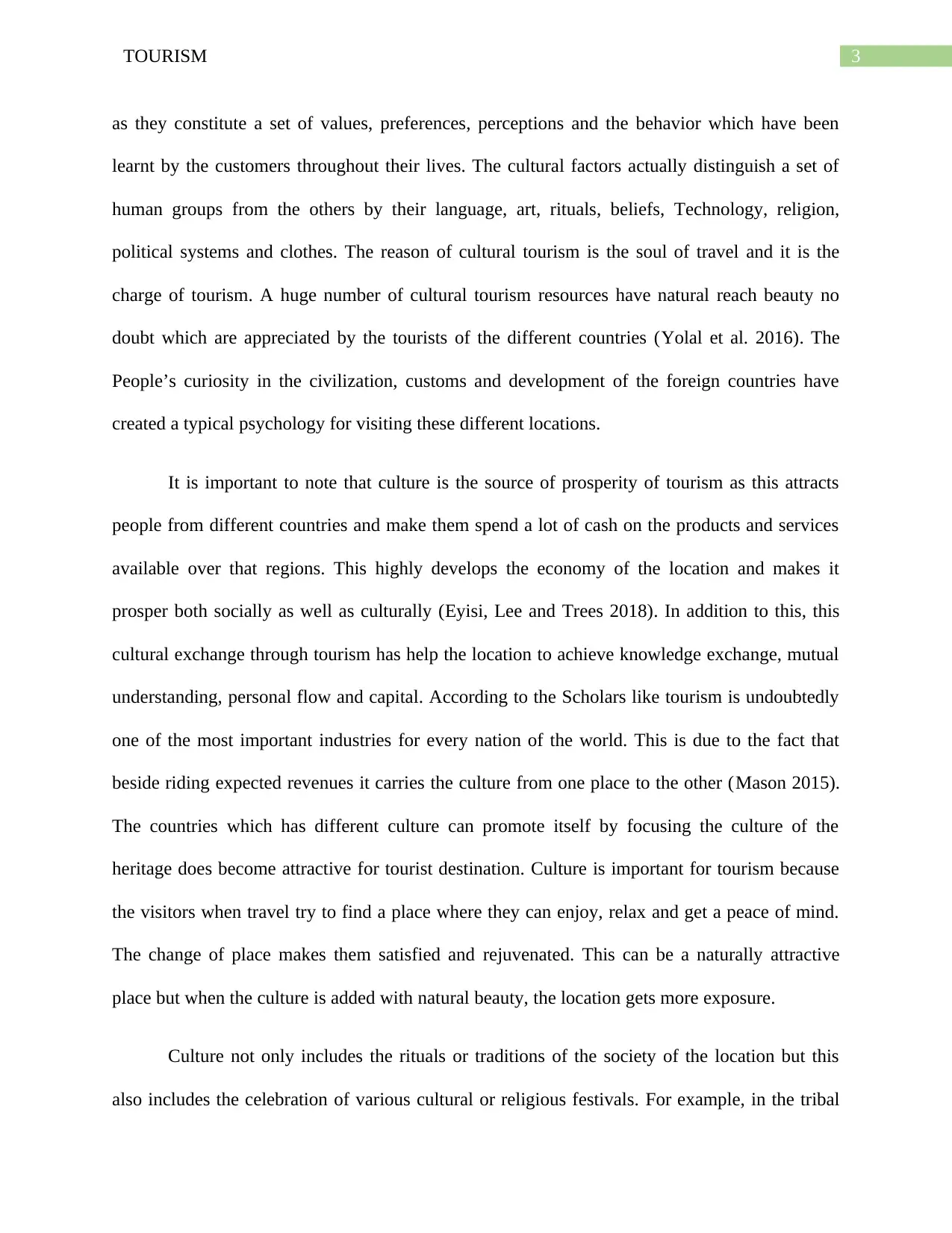
3TOURISM
as they constitute a set of values, preferences, perceptions and the behavior which have been
learnt by the customers throughout their lives. The cultural factors actually distinguish a set of
human groups from the others by their language, art, rituals, beliefs, Technology, religion,
political systems and clothes. The reason of cultural tourism is the soul of travel and it is the
charge of tourism. A huge number of cultural tourism resources have natural reach beauty no
doubt which are appreciated by the tourists of the different countries (Yolal et al. 2016). The
People’s curiosity in the civilization, customs and development of the foreign countries have
created a typical psychology for visiting these different locations.
It is important to note that culture is the source of prosperity of tourism as this attracts
people from different countries and make them spend a lot of cash on the products and services
available over that regions. This highly develops the economy of the location and makes it
prosper both socially as well as culturally (Eyisi, Lee and Trees 2018). In addition to this, this
cultural exchange through tourism has help the location to achieve knowledge exchange, mutual
understanding, personal flow and capital. According to the Scholars like tourism is undoubtedly
one of the most important industries for every nation of the world. This is due to the fact that
beside riding expected revenues it carries the culture from one place to the other (Mason 2015).
The countries which has different culture can promote itself by focusing the culture of the
heritage does become attractive for tourist destination. Culture is important for tourism because
the visitors when travel try to find a place where they can enjoy, relax and get a peace of mind.
The change of place makes them satisfied and rejuvenated. This can be a naturally attractive
place but when the culture is added with natural beauty, the location gets more exposure.
Culture not only includes the rituals or traditions of the society of the location but this
also includes the celebration of various cultural or religious festivals. For example, in the tribal
as they constitute a set of values, preferences, perceptions and the behavior which have been
learnt by the customers throughout their lives. The cultural factors actually distinguish a set of
human groups from the others by their language, art, rituals, beliefs, Technology, religion,
political systems and clothes. The reason of cultural tourism is the soul of travel and it is the
charge of tourism. A huge number of cultural tourism resources have natural reach beauty no
doubt which are appreciated by the tourists of the different countries (Yolal et al. 2016). The
People’s curiosity in the civilization, customs and development of the foreign countries have
created a typical psychology for visiting these different locations.
It is important to note that culture is the source of prosperity of tourism as this attracts
people from different countries and make them spend a lot of cash on the products and services
available over that regions. This highly develops the economy of the location and makes it
prosper both socially as well as culturally (Eyisi, Lee and Trees 2018). In addition to this, this
cultural exchange through tourism has help the location to achieve knowledge exchange, mutual
understanding, personal flow and capital. According to the Scholars like tourism is undoubtedly
one of the most important industries for every nation of the world. This is due to the fact that
beside riding expected revenues it carries the culture from one place to the other (Mason 2015).
The countries which has different culture can promote itself by focusing the culture of the
heritage does become attractive for tourist destination. Culture is important for tourism because
the visitors when travel try to find a place where they can enjoy, relax and get a peace of mind.
The change of place makes them satisfied and rejuvenated. This can be a naturally attractive
place but when the culture is added with natural beauty, the location gets more exposure.
Culture not only includes the rituals or traditions of the society of the location but this
also includes the celebration of various cultural or religious festivals. For example, in the tribal
Paraphrase This Document
Need a fresh take? Get an instant paraphrase of this document with our AI Paraphraser
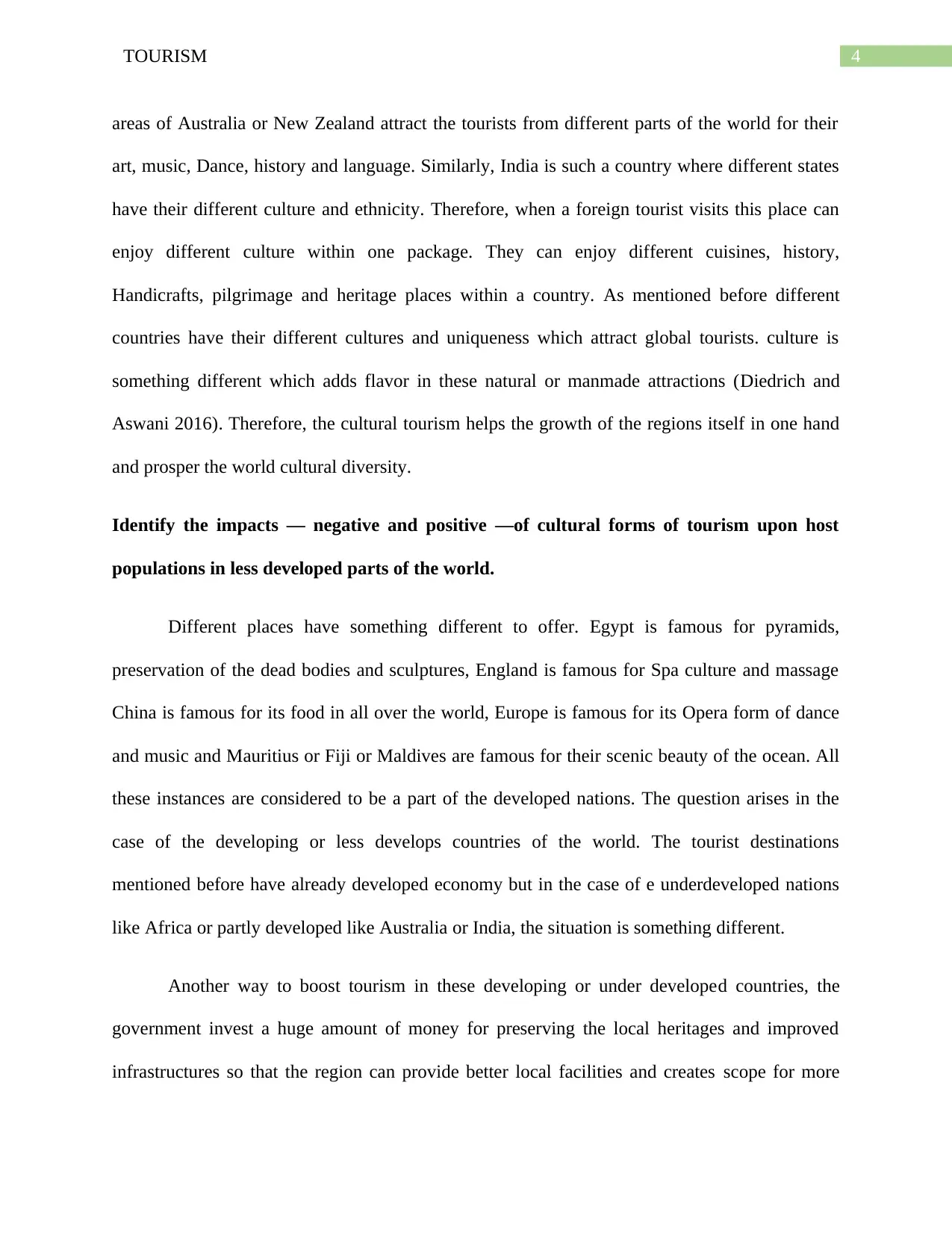
4TOURISM
areas of Australia or New Zealand attract the tourists from different parts of the world for their
art, music, Dance, history and language. Similarly, India is such a country where different states
have their different culture and ethnicity. Therefore, when a foreign tourist visits this place can
enjoy different culture within one package. They can enjoy different cuisines, history,
Handicrafts, pilgrimage and heritage places within a country. As mentioned before different
countries have their different cultures and uniqueness which attract global tourists. culture is
something different which adds flavor in these natural or manmade attractions (Diedrich and
Aswani 2016). Therefore, the cultural tourism helps the growth of the regions itself in one hand
and prosper the world cultural diversity.
Identify the impacts — negative and positive —of cultural forms of tourism upon host
populations in less developed parts of the world.
Different places have something different to offer. Egypt is famous for pyramids,
preservation of the dead bodies and sculptures, England is famous for Spa culture and massage
China is famous for its food in all over the world, Europe is famous for its Opera form of dance
and music and Mauritius or Fiji or Maldives are famous for their scenic beauty of the ocean. All
these instances are considered to be a part of the developed nations. The question arises in the
case of the developing or less develops countries of the world. The tourist destinations
mentioned before have already developed economy but in the case of e underdeveloped nations
like Africa or partly developed like Australia or India, the situation is something different.
Another way to boost tourism in these developing or under developed countries, the
government invest a huge amount of money for preserving the local heritages and improved
infrastructures so that the region can provide better local facilities and creates scope for more
areas of Australia or New Zealand attract the tourists from different parts of the world for their
art, music, Dance, history and language. Similarly, India is such a country where different states
have their different culture and ethnicity. Therefore, when a foreign tourist visits this place can
enjoy different culture within one package. They can enjoy different cuisines, history,
Handicrafts, pilgrimage and heritage places within a country. As mentioned before different
countries have their different cultures and uniqueness which attract global tourists. culture is
something different which adds flavor in these natural or manmade attractions (Diedrich and
Aswani 2016). Therefore, the cultural tourism helps the growth of the regions itself in one hand
and prosper the world cultural diversity.
Identify the impacts — negative and positive —of cultural forms of tourism upon host
populations in less developed parts of the world.
Different places have something different to offer. Egypt is famous for pyramids,
preservation of the dead bodies and sculptures, England is famous for Spa culture and massage
China is famous for its food in all over the world, Europe is famous for its Opera form of dance
and music and Mauritius or Fiji or Maldives are famous for their scenic beauty of the ocean. All
these instances are considered to be a part of the developed nations. The question arises in the
case of the developing or less develops countries of the world. The tourist destinations
mentioned before have already developed economy but in the case of e underdeveloped nations
like Africa or partly developed like Australia or India, the situation is something different.
Another way to boost tourism in these developing or under developed countries, the
government invest a huge amount of money for preserving the local heritages and improved
infrastructures so that the region can provide better local facilities and creates scope for more
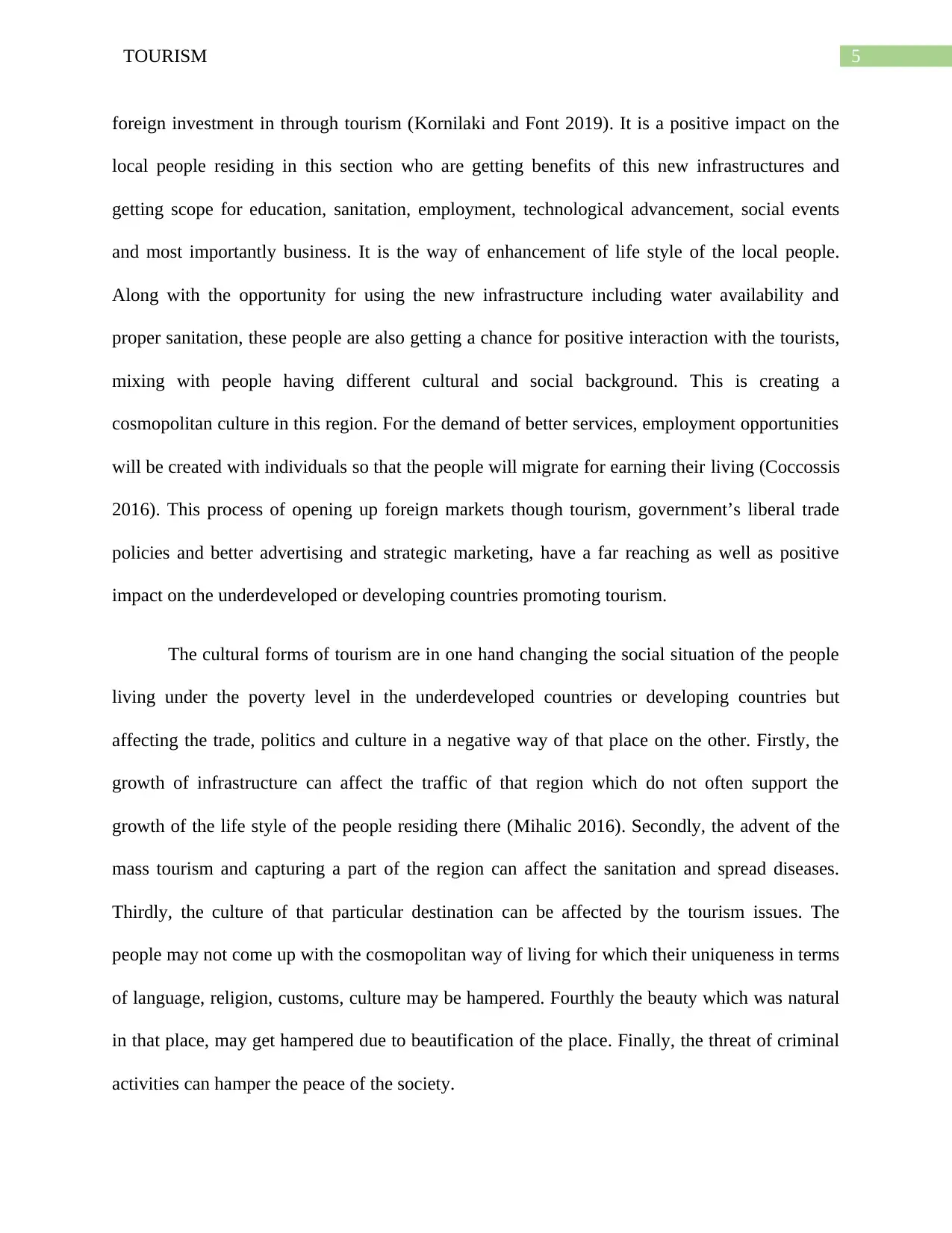
5TOURISM
foreign investment in through tourism (Kornilaki and Font 2019). It is a positive impact on the
local people residing in this section who are getting benefits of this new infrastructures and
getting scope for education, sanitation, employment, technological advancement, social events
and most importantly business. It is the way of enhancement of life style of the local people.
Along with the opportunity for using the new infrastructure including water availability and
proper sanitation, these people are also getting a chance for positive interaction with the tourists,
mixing with people having different cultural and social background. This is creating a
cosmopolitan culture in this region. For the demand of better services, employment opportunities
will be created with individuals so that the people will migrate for earning their living (Coccossis
2016). This process of opening up foreign markets though tourism, government’s liberal trade
policies and better advertising and strategic marketing, have a far reaching as well as positive
impact on the underdeveloped or developing countries promoting tourism.
The cultural forms of tourism are in one hand changing the social situation of the people
living under the poverty level in the underdeveloped countries or developing countries but
affecting the trade, politics and culture in a negative way of that place on the other. Firstly, the
growth of infrastructure can affect the traffic of that region which do not often support the
growth of the life style of the people residing there (Mihalic 2016). Secondly, the advent of the
mass tourism and capturing a part of the region can affect the sanitation and spread diseases.
Thirdly, the culture of that particular destination can be affected by the tourism issues. The
people may not come up with the cosmopolitan way of living for which their uniqueness in terms
of language, religion, customs, culture may be hampered. Fourthly the beauty which was natural
in that place, may get hampered due to beautification of the place. Finally, the threat of criminal
activities can hamper the peace of the society.
foreign investment in through tourism (Kornilaki and Font 2019). It is a positive impact on the
local people residing in this section who are getting benefits of this new infrastructures and
getting scope for education, sanitation, employment, technological advancement, social events
and most importantly business. It is the way of enhancement of life style of the local people.
Along with the opportunity for using the new infrastructure including water availability and
proper sanitation, these people are also getting a chance for positive interaction with the tourists,
mixing with people having different cultural and social background. This is creating a
cosmopolitan culture in this region. For the demand of better services, employment opportunities
will be created with individuals so that the people will migrate for earning their living (Coccossis
2016). This process of opening up foreign markets though tourism, government’s liberal trade
policies and better advertising and strategic marketing, have a far reaching as well as positive
impact on the underdeveloped or developing countries promoting tourism.
The cultural forms of tourism are in one hand changing the social situation of the people
living under the poverty level in the underdeveloped countries or developing countries but
affecting the trade, politics and culture in a negative way of that place on the other. Firstly, the
growth of infrastructure can affect the traffic of that region which do not often support the
growth of the life style of the people residing there (Mihalic 2016). Secondly, the advent of the
mass tourism and capturing a part of the region can affect the sanitation and spread diseases.
Thirdly, the culture of that particular destination can be affected by the tourism issues. The
people may not come up with the cosmopolitan way of living for which their uniqueness in terms
of language, religion, customs, culture may be hampered. Fourthly the beauty which was natural
in that place, may get hampered due to beautification of the place. Finally, the threat of criminal
activities can hamper the peace of the society.
⊘ This is a preview!⊘
Do you want full access?
Subscribe today to unlock all pages.

Trusted by 1+ million students worldwide
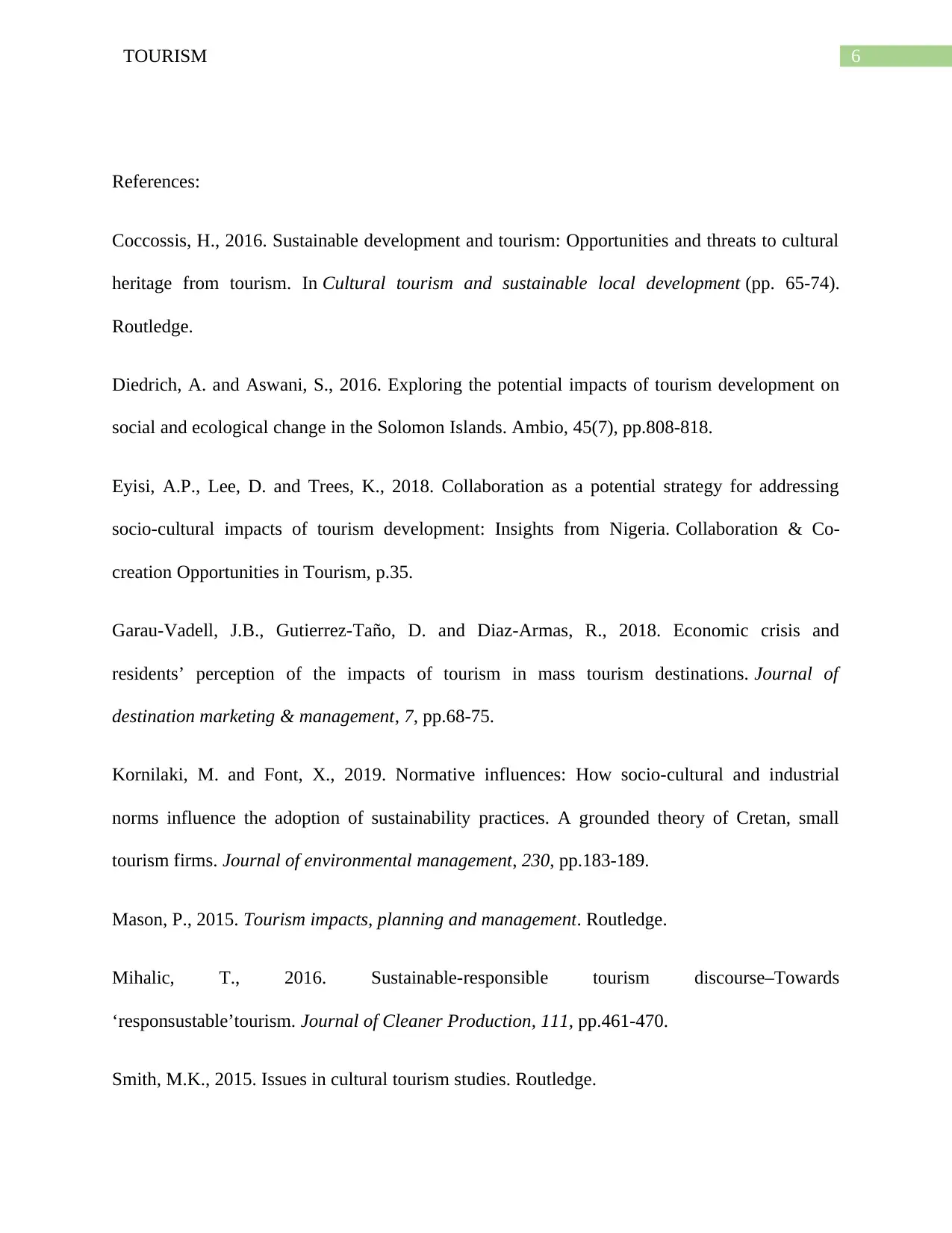
6TOURISM
References:
Coccossis, H., 2016. Sustainable development and tourism: Opportunities and threats to cultural
heritage from tourism. In Cultural tourism and sustainable local development (pp. 65-74).
Routledge.
Diedrich, A. and Aswani, S., 2016. Exploring the potential impacts of tourism development on
social and ecological change in the Solomon Islands. Ambio, 45(7), pp.808-818.
Eyisi, A.P., Lee, D. and Trees, K., 2018. Collaboration as a potential strategy for addressing
socio-cultural impacts of tourism development: Insights from Nigeria. Collaboration & Co-
creation Opportunities in Tourism, p.35.
Garau-Vadell, J.B., Gutierrez-Taño, D. and Diaz-Armas, R., 2018. Economic crisis and
residents’ perception of the impacts of tourism in mass tourism destinations. Journal of
destination marketing & management, 7, pp.68-75.
Kornilaki, M. and Font, X., 2019. Normative influences: How socio-cultural and industrial
norms influence the adoption of sustainability practices. A grounded theory of Cretan, small
tourism firms. Journal of environmental management, 230, pp.183-189.
Mason, P., 2015. Tourism impacts, planning and management. Routledge.
Mihalic, T., 2016. Sustainable-responsible tourism discourse–Towards
‘responsustable’tourism. Journal of Cleaner Production, 111, pp.461-470.
Smith, M.K., 2015. Issues in cultural tourism studies. Routledge.
References:
Coccossis, H., 2016. Sustainable development and tourism: Opportunities and threats to cultural
heritage from tourism. In Cultural tourism and sustainable local development (pp. 65-74).
Routledge.
Diedrich, A. and Aswani, S., 2016. Exploring the potential impacts of tourism development on
social and ecological change in the Solomon Islands. Ambio, 45(7), pp.808-818.
Eyisi, A.P., Lee, D. and Trees, K., 2018. Collaboration as a potential strategy for addressing
socio-cultural impacts of tourism development: Insights from Nigeria. Collaboration & Co-
creation Opportunities in Tourism, p.35.
Garau-Vadell, J.B., Gutierrez-Taño, D. and Diaz-Armas, R., 2018. Economic crisis and
residents’ perception of the impacts of tourism in mass tourism destinations. Journal of
destination marketing & management, 7, pp.68-75.
Kornilaki, M. and Font, X., 2019. Normative influences: How socio-cultural and industrial
norms influence the adoption of sustainability practices. A grounded theory of Cretan, small
tourism firms. Journal of environmental management, 230, pp.183-189.
Mason, P., 2015. Tourism impacts, planning and management. Routledge.
Mihalic, T., 2016. Sustainable-responsible tourism discourse–Towards
‘responsustable’tourism. Journal of Cleaner Production, 111, pp.461-470.
Smith, M.K., 2015. Issues in cultural tourism studies. Routledge.
Paraphrase This Document
Need a fresh take? Get an instant paraphrase of this document with our AI Paraphraser
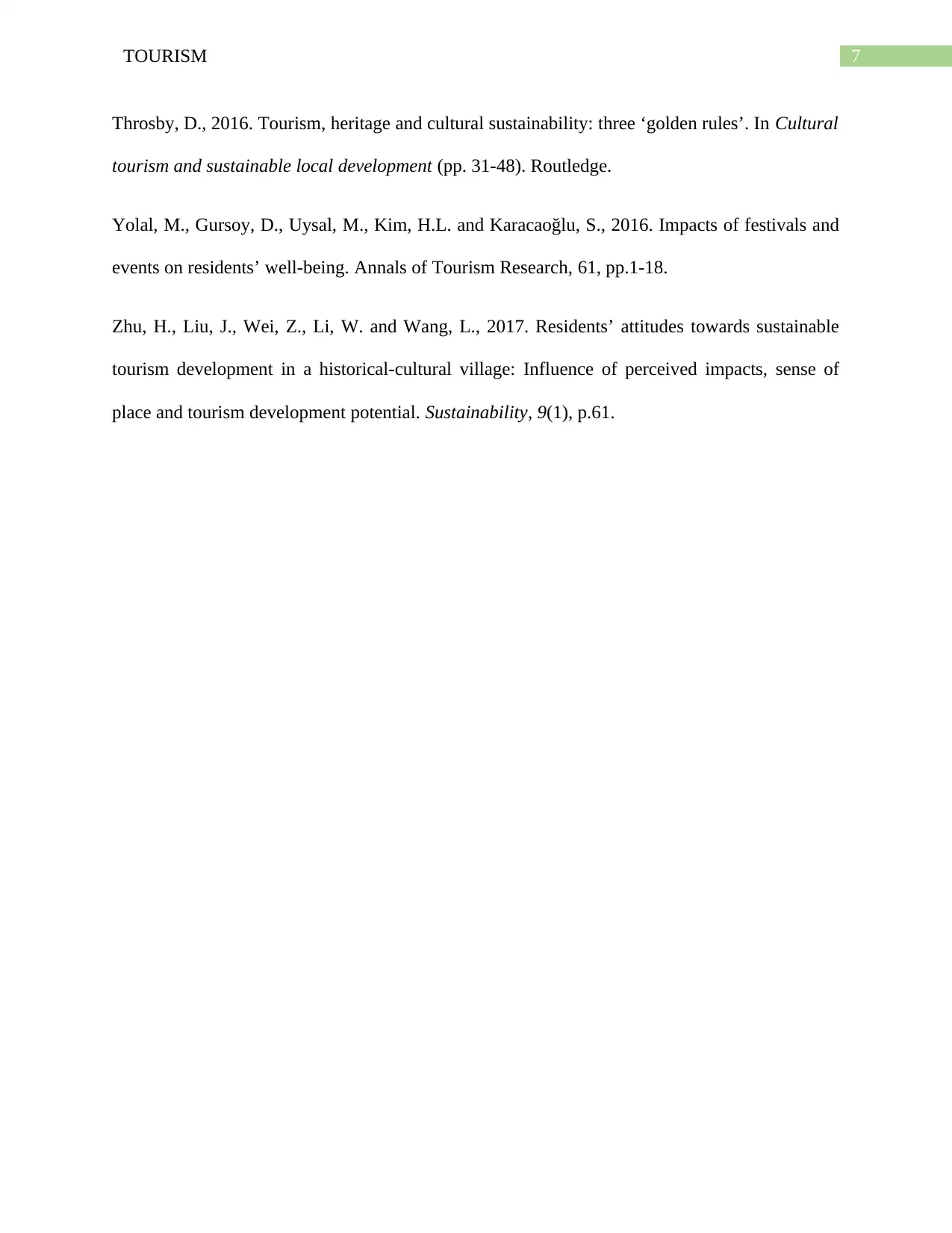
7TOURISM
Throsby, D., 2016. Tourism, heritage and cultural sustainability: three ‘golden rules’. In Cultural
tourism and sustainable local development (pp. 31-48). Routledge.
Yolal, M., Gursoy, D., Uysal, M., Kim, H.L. and Karacaoğlu, S., 2016. Impacts of festivals and
events on residents’ well-being. Annals of Tourism Research, 61, pp.1-18.
Zhu, H., Liu, J., Wei, Z., Li, W. and Wang, L., 2017. Residents’ attitudes towards sustainable
tourism development in a historical-cultural village: Influence of perceived impacts, sense of
place and tourism development potential. Sustainability, 9(1), p.61.
Throsby, D., 2016. Tourism, heritage and cultural sustainability: three ‘golden rules’. In Cultural
tourism and sustainable local development (pp. 31-48). Routledge.
Yolal, M., Gursoy, D., Uysal, M., Kim, H.L. and Karacaoğlu, S., 2016. Impacts of festivals and
events on residents’ well-being. Annals of Tourism Research, 61, pp.1-18.
Zhu, H., Liu, J., Wei, Z., Li, W. and Wang, L., 2017. Residents’ attitudes towards sustainable
tourism development in a historical-cultural village: Influence of perceived impacts, sense of
place and tourism development potential. Sustainability, 9(1), p.61.
1 out of 8
Related Documents
Your All-in-One AI-Powered Toolkit for Academic Success.
+13062052269
info@desklib.com
Available 24*7 on WhatsApp / Email
![[object Object]](/_next/static/media/star-bottom.7253800d.svg)
Unlock your academic potential
Copyright © 2020–2026 A2Z Services. All Rights Reserved. Developed and managed by ZUCOL.




